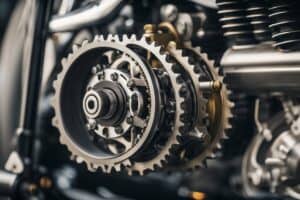Ever noticed a knocking sound coming from your motorcycle’s engine, especially as the miles rack up?
It’s not just a nuisance; it’s a cry for attention.
High-mileage engines can start to sound like they’re begging for a break, but understanding the cause is key to getting back on the road with confidence.
Knocking in motorcycle engines is often a symptom of underlying issues that range from simple fixes to signs of significant wear.
Whether you’re a seasoned rider or new to the game, knowing what to listen for can save you time and money down the line.
Let’s dive into what might be causing that unsettling noise and how you can address it.
Symptoms of Knocking Sounds in High-Mileage Motorcycle Engines
Knocking sounds in high-mileage motorcycle engines can vary widely in tone and timing.
Identifying these symptoms quickly may prevent further damage.
Here are some common indicators:
- Irregular Rhythms: Unlike the engine’s regular cadence, a knocking sound might be erratic or cyclical, indicating it’s not just a quirk of the engine running.
- Varying Intensity: The noise could be subtle at low speeds but grow louder and more pronounced with acceleration.
- Metallic Pings: It might sound like metal hitting metal, which could signify issues like detonation or pre-ignition.
When you hear a knocking noise, try to gauge the health of your engine by monitoring performance issues.
Loss of power or stalling alongside the knocking are red flags.
Keep an ear out for any changes after the engine warms up as cold startups sometimes emit temporary knocks.
Pay close attention to your motorcycle’s response during different riding conditions.
If knocks become more frequent during heavy acceleration or climbing hills, it’s a sign of the engine struggling under higher demands.
This symptom is essential for understanding the gravity of the situation.
Common Causes of Knocking Sounds in High-Mileage Motorcycle Engines

Knocking sounds in high-mileage motorcycle engines are often attributed to a variety of factors.
Wear and tear over extensive usage can lead to several components becoming compromised.
Piston Slap occurs when the piston moves slightly sideways and hits the cylinder wall.
This often happens due to the piston wearing down and is a common issue in older engines with high mileage.
Worn Bearings in the crankshaft or connecting rods can also cause a knocking sound.
Bearings are crucial for smooth engine operation, and once they deteriorate, they can lead to metal-on-metal contact that produces a distinctive knock.
Another potential cause is Detonation.
This happens when fuel ignites prematurely in the combustion chamber, often due to improper fuel grade or engine overheating.
The sudden explosion forces the piston down when it’s not ready, resulting in a knock.
- Incorrect Valve Timing
- Excessive Carbon Build-Up
- Loose or Damaged Engine Mounts
These are just a few factors that might be at play.
It’s important to diagnose the exact cause to address the issue effectively.
Regular maintenance checks can help you spot signs of wear before they escalate to knocking noises, saving you time and money in the long run.
1.
Low Oil Level or Dirty Oil
If you’ve been riding your motorcycle for miles on end, it’s possible that low oil levels are causing that troublesome knocking sound.
Proper lubrication is crucial for engine health, and without enough oil, the moving parts inside your engine start to grind against each other.
This friction often results in a distinct knocking sound indicative of a lubrication issue.
Here’s what to keep in mind:
- Regularly check your oil level to prevent it from dropping too low.
- Use the right grade of oil as specified by your motorcycle manufacturer.
- Change your oil at the recommended intervals.
Dirty oil can also lead to problems.
Over time, oil collects contaminants that cause it to lose its viscosity and lubricating properties.
This dirty oil may become too thick or abrasive, amplifying wear on engine components and leading to Knocking Noises.
Replacing old, dirty oil with fresh, high-quality oil can often silence those unnerving sounds coming from your engine.
Remember, keeping your oil clean is just as important as keeping it topped up.
2.
Engine Detonation
When your motorcycle begins to produce a knocking sound, one culprit could be engine detonation.
Also known as spark knock, detonation occurs when the fuel-air mixture within the cylinders ignites unevenly.
This results in multiple flame fronts colliding, creating shock waves that cause a characteristic pinging or knocking noise.
Several factors can lead to detonation in high-mileage engines:
- Low octane fuel that’s unable to resist early combustion.
- Overly advanced ignition timing that sparks the fuel-air mix too soon.
- High engine temperatures or hot spots within the combustion chamber.
- Accumulated carbon deposits which raise compression inside the cylinders.
You’ll want to ensure you’re using the correct octane fuel for your motorcycle, as higher octane gas can withstand higher pressures before igniting.
It’s equally important to have your ignition timing checked and adjusted if necessary.
Neglecting these aspects can intensify detonation issues, leading to potential engine damage.
To mitigate the risk of detonation, regular maintenance is key.
Inspecting and cleaning the combustion chambers will help remove carbon deposits, and installing a cooler thermostat can aid in lowering the engine’s running temperature.
Such proactive steps can improve your engine’s longevity and reduce the likelihood of knocking sounds due to detonation in the future.
3.
Worn Piston Rings or Cylinder Walls
When you’re dealing with high-mileage motorcycles, worn piston rings or cylinder walls are often culprits behind knocking sounds.
These components are critical for maintaining the compression and minimizing the leakage of combustion gases.
Over time and with extensive use, the sealed environment they help create can be compromised.
Motorcycles with a lot of miles may exhibit these signs:
- Decreased engine compression
- Increased oil consumption
- Excessive exhaust smoke
If the piston rings are worn, they fail to seal the gap between the piston and the cylinder wall effectively.
This failure allows combustion gases to bypass the piston and enter the oil pan, leading to pressure build-up and knocking.
Similarly, deteriorating cylinder walls can lead to imprecise piston movement.
As the pistons start to “slap” against the worn walls, you’ll notice a pronounced knocking sound during operation.
It’s essential to monitor these signs and act quickly as they can lead to further engine damage.
Regular inspection of your motorcycle’s engine components is key to spotting early wear and tear.
To maintain optimal engine performance and longevity, ensure you keep up with routine maintenance and address issues related to worn-out parts promptly.
4. Loose or Damaged Engine Components
As you delve further into the causes of knocking sounds in high-mileage motorcycle engines, don’t overlook the impact of loose or damaged components.
Mounting brackets, bolts, and nuts may loosen over time due to vibrations and regular wear, causing them to rattle against the frame or engine casing.
Internal engine components such as connecting rods, bearings, or even the crankshaft might be at fault.
Should these parts suffer from wear or damage, it’s no surprise that you’ll hear knocking.
The metal-on-metal contact is a telltale sign that these components need immediate attention.
Keep a keen eye on:
- Rod knock, often caused by a worn-out bearing that allows the rod to move excessively
- The sound of a loose timing chain clanging against the casing
- Valvetrain noise, which can occur if the hydraulic lifters become faulty or if there’s excessive clearance in the valve train
Routinely inspect these parts and secure or replace them when necessary.
Loose or damaged engine components can drastically reduce your motorcycle’s performance and even lead to catastrophic engine failure if not addressed promptly.
5. Fuel Quality and Octane Rating
Fuel quality plays a pivotal role in the health and efficiency of your motorcycle engine.
Inferior quality fuel can lead to a myriad of problems, not the least of which is the engine knocking you may be experiencing.
Contaminants or water in the gas can hamper combustion, causing pre-ignition and subsequent knocking sounds.
The octane rating of gasoline is an indicator of its ability to resist knocking during combustion.
High-mileage engines especially benefit from higher octane fuel, as it burns cleaner and reduces the likelihood of pre-ignition.
If you’ve been using lower octane fuel, consider upgrading to a higher rating.
- Standard gasoline: May not suffice for older or high-performance engines
- Premium gasoline: Typically has a higher octane rating, beneficial for preventing knocking
Always refer to your motorcycle’s owner’s manual for the manufacturer’s recommended octane rating and stick to it to ensure peak performance.
Remember, it’s not just about the immediate running condition but prolonging your engine’s life and efficiency.
How to Address Knocking Sounds in High-Mileage Motorcycle Engines
Addressing knocking sounds in your high-mileage motorcycle is critical for maintaining the health and longevity of the engine.
It’s essential to diagnose the issue accurately and take the necessary steps to remedy the problem.
Begin with a Thorough Inspection of the engine.
Identify any loose parts that could be causing the noise and secure them.
Check for worn-out components such as spark plugs, bearings, and timing chains that may need replacement.
Consult Your Motorcycle’s Manual for recommended service intervals.
High-mileage engines often require more frequent maintenance.
Adhering to these schedules can prevent issues before they arise.
Use Higher Octane Fuel if your motorcycle’s manual suggests it’s beneficial for your model.
This can sometimes mitigate knocking by reducing pre-ignition in the combustion process.
Regularly Replacing the Oil and Oil Filter will help to ensure adequate lubrication of engine components, which can decrease the likelihood of knocking sounds developing.
Look into Engine Decarbonizing products or services as they might help to clean out carbon buildup which is a common culprit behind knocking.
If you’re not comfortable tackling these issues yourself, it’s always a smart idea to Consult a Professional Mechanic.
They can offer a more precise diagnosis and skilled repair work to resolve knocking sounds.
Frequently Asked Questions
What causes knocking sounds in high-mileage motorcycle engines?
Knocking sounds in high-mileage motorcycle engines can be caused by a variety of issues including loose components, worn-out parts, and the need for higher octane fuel.
Regular wear and tear over time can lead to parts becoming less effective at damping vibration and noise.
How can I diagnose the source of a knocking sound in my motorcycle engine?
To diagnose a knocking sound, you should start with a thorough inspection of the engine.
Look for any loose parts and check for signs of wear on components that could be the source of the noise.
It’s also important to refer to your motorcycle’s manual for specific troubleshooting tips.
Is using higher octane fuel recommended for high-mileage motorcycles?
Using higher octane fuel can be beneficial for some high-mileage motorcycles, particularly if the manufacturer recommends it or if the engine knocks when using lower octane fuel.
Higher octane can prevent pre-ignition and knocking sounds to some extent.
How often should I replace the oil and oil filter in my motorcycle?
Oil and oil filter replacement should follow the intervals recommended in your motorcycle’s manual.
Generally, it’s advised to replace the oil and oil filter every few thousand miles, but this can vary depending on the motorcycle make and model.
Are engine decarbonizing products beneficial for high-mileage motorcycle engines?
Engine decarbonizing products can help clean deposits within the engine that might contribute to knocking sounds.
However, their effectiveness depends on the specific circumstances of the engine’s condition and should be used as part of a broader maintenance strategy.
Should I attempt to fix a knocking motorcycle engine myself?
If you have experience with motorcycle maintenance and feel comfortable with DIY repairs, you may attempt to fix the engine yourself.
If you’re unsure or the issue is complex, it is always best to consult a professional mechanic.
As an Amazon Associate we earn from qualifying purchases.













